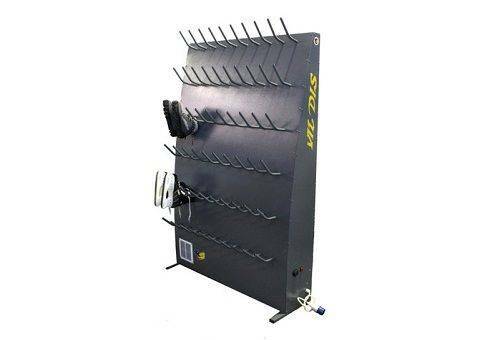Compressor - an indispensable device without which it can not do either in the garage or on a construction site or in the workplace. Here are just a select compressor is not so easy, because they razovidnostey very much. We are often asked what the best compressor: oil or oil-free? Well now face it.
CONTENT
- 1 Air compressors: a brief educational program
- 2 What is the difference between oil and oil-free compressors
- 3 Features of operation of oil and oil-free compressors
- 4 Popular issues
- 5 conclusions
Air compressors: a brief educational program
Compressor - a device for pressurizing and pumping gas. In fact, this is one of the types of pumps, just not designed to work with fluids and with air or other gases. Compressors are used in almost all spheres of human life. The most simple and portable pump up air mattresses and car wheels - carry such device in the trunk of motorists. More powerful units feed pneumatic tools and help in dyeing machines and parts. The heaviest and powerful compressors are used on construction sites and factories. In general, depending on the objectives pursued by the person, every type of compressors finds its place. Accordingly, in order to select the correct compressor, you need to imagine what it is you need, otherwise long and confused because a whole lot of types of compressors.
There are three-dimensional and dynamic compressors, electric and diesel, mobile and stationary. All these devices are different and the internal mechanics, and on the principle of works, and supply a method and a million other factors. In this article we are most interested in the difference between the compressor oil and oil-free.
What is the difference between oil and oil-free compressors
If you look in general, oil and oil-free compressors are arranged very similar: the same power unit, the same piston group, the same crankshaft, the same drive system. In addition, it would be wrong to assume that the oil-free compressor does not need oil or grease. Here it is a little different: from the compressor oil channels for lubrication and fluid intersect, while oil-free they are isolated from each other.
Oil compressors require oil in the Gulf of compressor crankcase. The lubricant is distributed over all the internal unit and directly involved in the process of pumping air. Oil level you need to follow, otherwise the compressor will not work properly. Oil-free models of such care does not require.
Advantages and disadvantages of oil compressor
Oil compressors require proper care: first of all, it concerns the maintenance of the lubricant level. After each use, you need to check the oil level and add if necessary to the working values. But that's what makes compressors of this type are extremely hardy, powerful and efficient engines. Compressor oil, not even for industrial use, can long maintain the desired pressure and work almost without interruption. Lubrication improves the service life and performance of the compressor equipment to the limit. At the same time, in the air that shake the car, there will inevitably be present oil particles, so that the compressor oil can be used everywhere.
Advantages and disadvantages of oil-free compressor
Oil-free compressors also need lubrication, but air and oil circuits have, as mentioned above, do not intersect. Since pumping air directly into the oil is not involved, the case with the lubricant and cooling compressors in this type of situation is not so rosy as that of oil. It uses modern materials with a low coefficient of friction, but the life of the oil-free devices have not too high. It is desirable that they work not more than 10-15 minutes per hour, otherwise overheating can easily cause damage. The main advantages of this type of compressor is that they are much smaller, lighter and easier to clean than the oil model. Besides air output from them is much cleaner, so that the apparatus can be used for oil-free industries sensitive to the quality of the feed gas.
Features of operation of oil and oil-free compressors
Advantages and drawbacks of compressor oil, make them most suitable for industrial and professional use. Since these units are capable of continuous operation, they are used in enterprises with continuous production cycle. In addition, high power compressors Oil makes an indispensable equipment in construction and other demanding environments. Finally, for painting, for example, it is desirable to use a car just oil compressors - paint bubbles of oil-free units due to the large amount of hydrogen in the feed of air.
Oil-free compressors are not possess such outstanding characteristics as their counterparts oil. However, they are lighter, more compact, require minimal maintenance, and most importantly - cheaper oil. Therefore, this type of devices are best suited to work in the garage and even in everyday life. Care they require little, and when careful operation capable of for years to pump up tires, feed the tool and perform other daily activities. In addition, the air supplied to these devices, much cleaner, so, for example, compressed air tools powered by them are working longer and safer.
Popular issues
What is the performance of compressors needed for painting a car?
For painting car oil suitable compressor with a capacity of anywhere from 190 liters per minute.
Suitability of oil and oil-free compressors for pumping tires?
Typically, tire swap use simple oil-free compressors - their capacity for that missing head.
conclusions
So what are the best compressors: oil or oil-free? Everything depends on your point of view and your needs. Used in the production of expensive, powerful and reliable oil machines. In everyday life where better to look cheap and easy to use oil-free.



